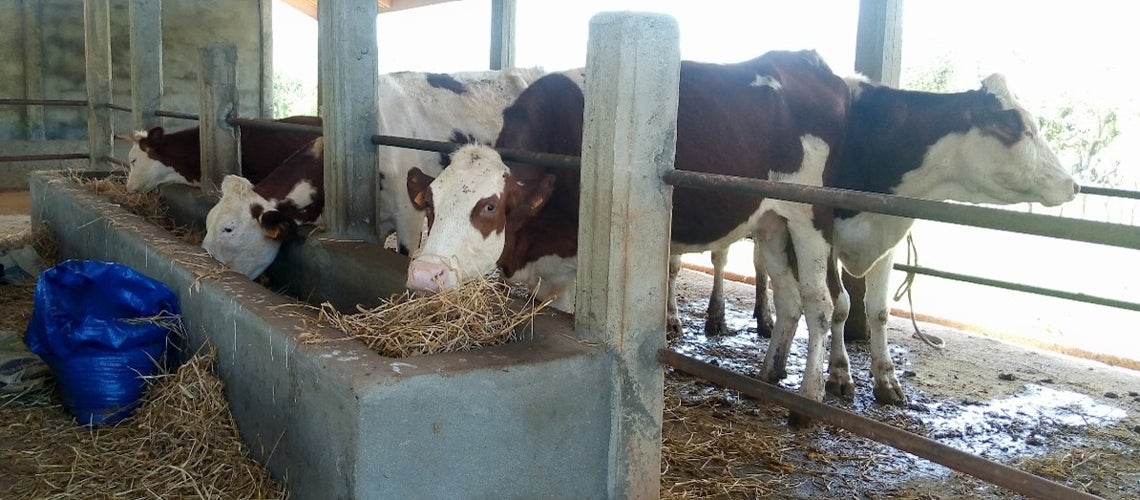 Moussa A’s cattle shed in Darang, Cameroon. Credit: Kadhija Ngondi Njoya @World Bank
Moussa A’s cattle shed in Darang, Cameroon. Credit: Kadhija Ngondi Njoya @World Bank
Moussa knows how to handle just about every challenge related to tending cattle. But despite a store of knowledge passed down through a long line of herder-farmers and pastoralists in Darang, in the Adamawa region of Cameroon, and although he has managed cattle for almost 40 years and now owns two cooperatives, his skills are increasingly being tested.
Erratic weather patterns influenced by climate change make providing food and water to his dairy cattle more complex. “Over the past 30 years, it has been a lot hotter during the dry seasons,” Moussa notes. “And dry seasons are also longer.”
Dry seasons used to last for five months, but now they can go on for eight months, which increases the risk of high mortality rates among the cattle.
In the past, during the dry season, Moussa often had to herd his livestock over great distances in search of nourishing pastures, feed, and water. But Moussa seeks out and embraces innovation. Today he applies adaptive water and forage management practices to better protect his animals against the threat of drought, which brings premature death.
“We finally dug bore holes and planted fodder fields to deal with the extended droughts during the dry season,” Moussa says, noting he has not lost any animals since he took these steps.

“We harvest and store the forage for the dry season, so we do not need to displace the cattle anymore.” His five-hectare fodder field produces hay and cottonseeds. “We have harvested at least 2,000 kg of seeds this year,” he says.
Moussa grows potatoes, maize, groundnuts, and vegetables, using cow manure as fertilizer to improve the nutritional quality of the soil.

Moussa receives technical and financial support through the Livestock Development Project (PRODEL), implemented by Cameroon’s Ministry of Livestock, Fisheries and Animal Industries (MINEPIA).
Funded by a $100 million loan from the World Bank, the project aims to improve the productivity of livestock systems and the marketing of livestock products. Farmers receive technical training, capacity building, and financial support for designing and implementing business plans. PRODEL also finances interventions to support animal health and access quality inputs, as well as improved management of pastoral resources.
Livestock systems in Cameroon and across Sub-Saharan Africa are critical for scaling up climate-smart practices and technologies. While livestock support livelihoods and provide access to protein-dense food, it is directly affected by the impacts of climate change.
By improving the storage of cow manure on his farm, Moussa reduces the amount of greenhouse gases emitted. Another strategy is leaving residues from seeds, hay, and crops in the soil to improve its quality and contribute to climate change mitigation over time.
An assessment of PRODEL indicates that protein production from livestock systems increased while greenhouse gas emission intensity (the amount of greenhouse gases per unit of livestock product) decreased.
Lessons learned from PRODEL’s support to farmers have subsequently been consolidated in a MINEPIA National Climate-smart Livestock Strategy. The overall objective of the Strategy is to sustainably increase animal production while taking climate change into account, by: (i) orienting national livestock programs and projects towards climate change adaptation and mitigation; (ii) promoting the integration of climate change adaptation, mitigation, and transformation into livestock development policies at the national level; (iii) providing a strategic framework for Cameroon with respect to climate resilient livestock development; and (iv) monitoring and evaluating the country’s efforts to develop a climate-resilient livestock sub-sector.
Support for developing the Strategy was provided by the Program for Climate Smart Livestock Systems in Africa (PCSL), an initiative commissioned by the German Federal Ministry for Economic Cooperation and Development (BMZ) and implemented by the German Organization for International Cooperation (GIZ), the World Bank, and the International Livestock Research Institute (ILRI). The Program, which concluded in 2022, and aimed to foster “climate-smart” livestock management practices, monitoring systems, and policies across several African countries as well as provide guidance to upscale lessons learned. The program aligned with the World Bank’s Africa Climate Business Plan, which endorsed upscaling climate-smart agriculture across the continent.
Still, work on the farm can be a struggle.
“There are no activities without their difficulties,” Moussa observes. “People don’t show up for work. People have behavioral issues. We also face a lot of theft; sometimes, during the dry season, people start fires, which extends to our forage farms.”
While the National Climate-smart Livestock Strategy may not solve all of Moussa’s problems, it’s a good start. The incentives for innovation are clear to him, as his livestock farm and cooperatives support his family.



Join the Conversation